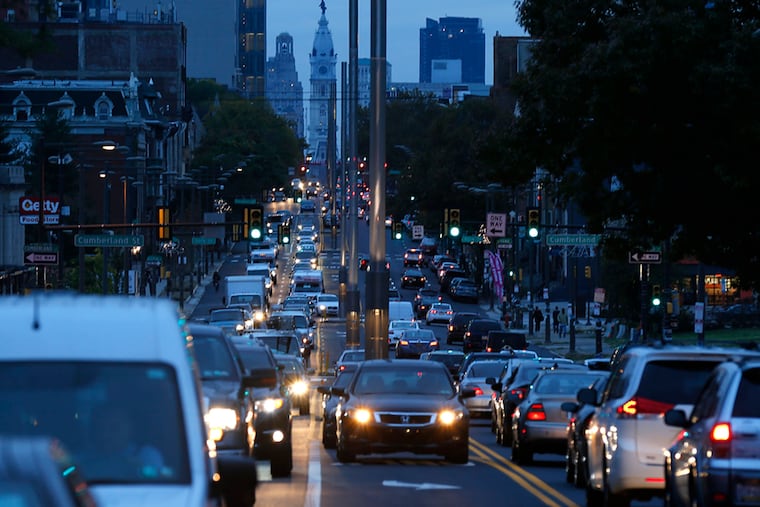Pennsylvania changed a law suspending driver’s licenses, but it won’t help thousands still banned from the road
Losing a driver’s license for years is “like another sentence” for people coming home from prison, former offenders say. Tens of thousands of people who never had a driving-related conviction still have suspended licenses.

Every time Chelsey Sirmons got arrested, the date he could legally drive again moved further out of reach. None of his crimes had to do with driving or cars: They were drug charges, such as possessing paraphernalia. But under Pennsylvania law, that meant an automatic license suspension.
Sirmons has been out of prison and in sober recovery for almost five years. He’s a certified recovery specialist in Pittsburgh and runs workshops for families dealing with substance abuse. He’s studying to earn a degree in social work.
But his string of misdemeanor convictions extended his driver’s license suspension. It’s not scheduled to end until 2026.
» READ MORE: The Probation Trap: Some Pennsylvania courts punish addiction relapse with ever-longer probation
Sirmons is one of an estimated tens of thousands — possibly more — in Pennsylvania who are barred from driving despite never having been convicted of a driving-related offense.
“When you’ve already served your time, and you come home and you’re trying to better your life, it’s like you’re still incarcerated," said Sirmons, 46. “It’s another sentence.”
Gov. Tom Wolf and state legislators last year passed a law that, going forward, eliminates such suspensions for violations unrelated to driving. But the law wasn’t retroactive, preventing countless Pennsylvanians from getting back on the road.
Not having a driver’s license can make it difficult for people to get and keep jobs, to see or care for their children, and to get medical or addiction care, especially in areas without robust public transportation. Advocates say suspensions for non-driving infractions are an unfair barrier to people who need to turn around their lives, increases the risk of addiction relapse, and disproportionately impact people of color or in poverty.
“It’s bad enough we’re battling all these uphill battles, but then, the system is out to keep us down as well,” Sirmons said.
Passed decades ago, the Pennsylvania law mirrored ones in other states that were tied to federal highway funding. The laws automatically suspended the licenses of anyone convicted of drug offenses, having a fake ID, or underage purchase of tobacco or alcohol. Only a handful of states, including New Jersey, still have such laws.
Civil rights advocates say Pennsylvania should make the new law retroactive, lifting suspensions for all former offenders.
Equal Justice Under Law, a Washington-based group, contends the governor and PennDot have the authority to do so. It plans to send a letter signed by more than 30 organizations to Wolf on Monday, asking him to act. Dozens of Pennsylvanians have contacted Equal Justice Under Law asking about their suspended licenses since the change was enacted last year, executive director Phil Telfeyan said.
Wolf’s office said that he can’t use an executive order in this case, but that his administration has been working with lawmakers on legislation that would provide retroactive relief for drivers with these types of suspensions. Wolf would “be eager to sign" such a bill, spokesperson J.J. Abbott said.
“Having a valid driver’s license can make a difference in finding and retaining employment, which can ultimately help with the payment of fines, costs, and restitution, and a reduction in recidivism," Wolf said when he signed the initial bill in October 2018, calling it “smart sentencing reform.”
A PennDot spokesperson said that the transportation agency “supports providing retroactive relief from these types of suspensions," but that such changes must come from the legislature.
Making laws retroactive can be complex because it can intersect with sentences imposed by judges, and because the license suspension policy was tied to federal funding, said Elizabeth Randol, legislative director at the ACLU of Pennsylvania.
Joyce Douglass, a retired state parole agent who is opening a sober-living house in Pittsburgh, said she saw a big difference between people coming out of prison with or without a valid license in terms of their ability to restart their lives and support families.
“If they lost their license for six months, then many times they lost their jobs and couldn’t get another one,” Douglass said, adding that she brought up the issue with bill sponsor and then-Rep. Rick Saccone (R., Allegheny-Washington) after seeing the effects of the suspensions. “There was just so much collateral damage.”
Anyone who drives with a suspended license risks further suspension or prison time.
“That’s the impossible Catch-22 people are being put in: It’s break the law and drive for necessary reasons, or forgo medical care [or] care for dependent relatives just because of the suspensions,” Telfeyan said.
In January 2018, 149,000 people were under suspension for a non-driving offense, according to information Equal Justice Under Law obtained through a lawsuit.
PennDot was unable to provide a current tally. Telfeyan estimated it would be in the tens of thousands. Douglass said the total could be higher because some people receive more suspensions if they are caught driving without a license.
“All of these people have license suspensions. Those are guys that have children and families that need a shot just as well as people who are being arrested today,” said Raymond Miles, an ex-offender and cofounder of Realistic ReEntry in Pittsburgh, which works on restorative justice and helps former inmates adjust to life outside prison.
“There’s just no logic in it," he said. "I’m watching it hurt a lot of people.”